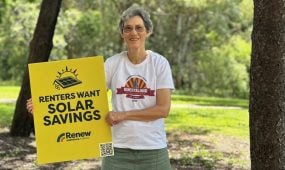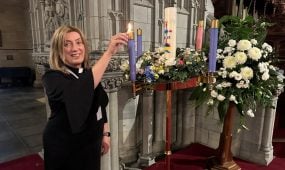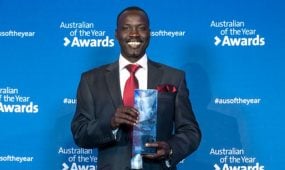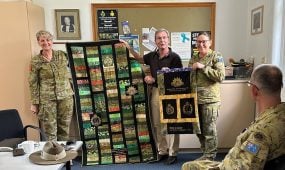Q&A with Jennifer Crocker, Church Warden and Liturgical Assistant at All Saints’ Church, Mitchell and Secretary for the MWAMA, food producer and land steward
Spotlight Q&A
Meet Jennifer Crocker and find out about her voluntary church work, what she is most looking forward to at Synod, the unique challenges faced by food producers and the simple things we as the broader Diocese can do to support food producers and landholders like Jennifer and her family
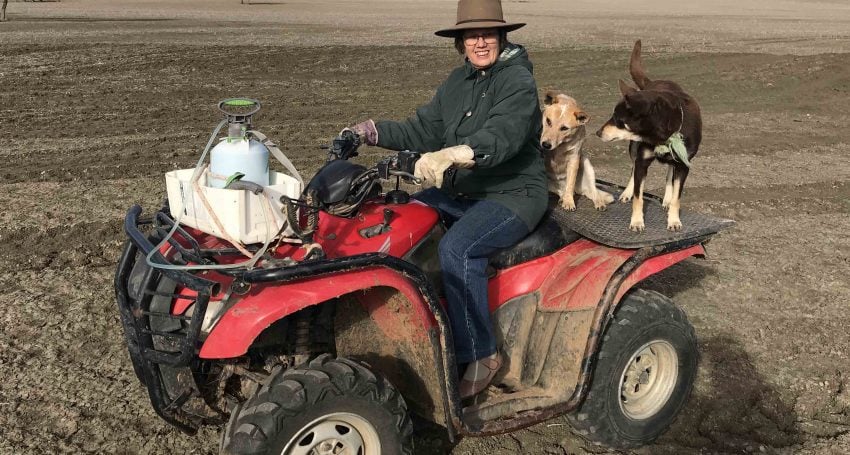
Jennifer Crocker is a Parish Councillor and Liturgical Assistant from All Saints’ Anglican Church, Mitchell in the Western Downs, over 500km west of Brisbane. She is a food producer, with a Bachelor of Agricultural Science from the University of Queensland. She is married to Malcolm Crocker, and is a mother of three sons and a daughter, and grandmother to three grandsons on the farm and three grand-daughters.
How long have you been involved in the Anglican Church?
My mother was in Mothers’ Union so I attended St Helen’s Church with my brother and three sisters. I have played the music in many country churches since St Anne’s School Townsville in the early 1960s but only joined Parish Council in Mitchell about 10 years ago.
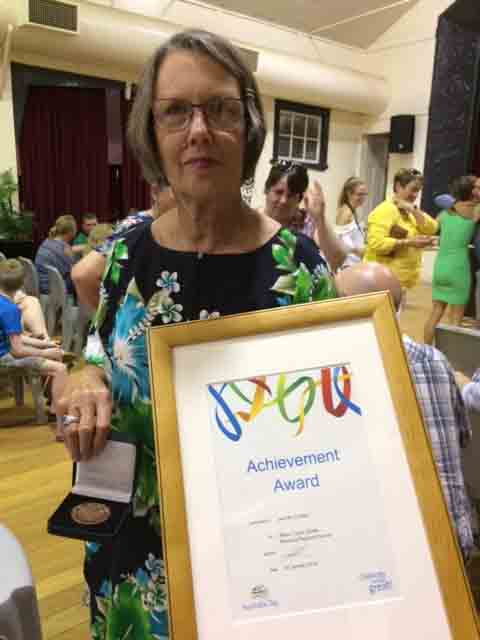
Jennifer Crocker with her 2019 Community Achievement Award
What are your current roles and what do your roles involve?
I am a Parish Councillor, Liturgical Assistant and organist in the Maranoa Warrego Anglican Mission Area (MWAMA). I am also the Secretary for MWAMA. In a mission area we function differently from a parish. I found it difficult to describe what I do. It is important to understand the population of rural Australia has declined 15% in 10 years.
Because I am 58km east from the church and the other warden is 110km south, we cannot do most of the duties normally attached to our titles. The only time I go to Mitchell is for services. Much of my Christian witness is through community work in more accessible communities of Amby (Country Women’s Association), Muckadilla (a community association and a music session for playgroup), and Roma (class help and playing the piano for weekly community singing at Pinaroo retirement home). I read Morning Prayer on the weeks The Rev’d Rick Gummow is in Charleville and Cunnamulla, and take responsibility for washing the altar linen, playing the music, organising readers, welcoming people, ensuring the collection is taken up, turning on garden hoses, overseeing functions of Parish Council and whatever else needs to be done. Fortunately, others also see what needs doing and so we share the tasks, but we don’t have enough people to have rosters. Everybody cooperates and we stay organised by email using the ‘Reply All’ button to keep everybody informed.
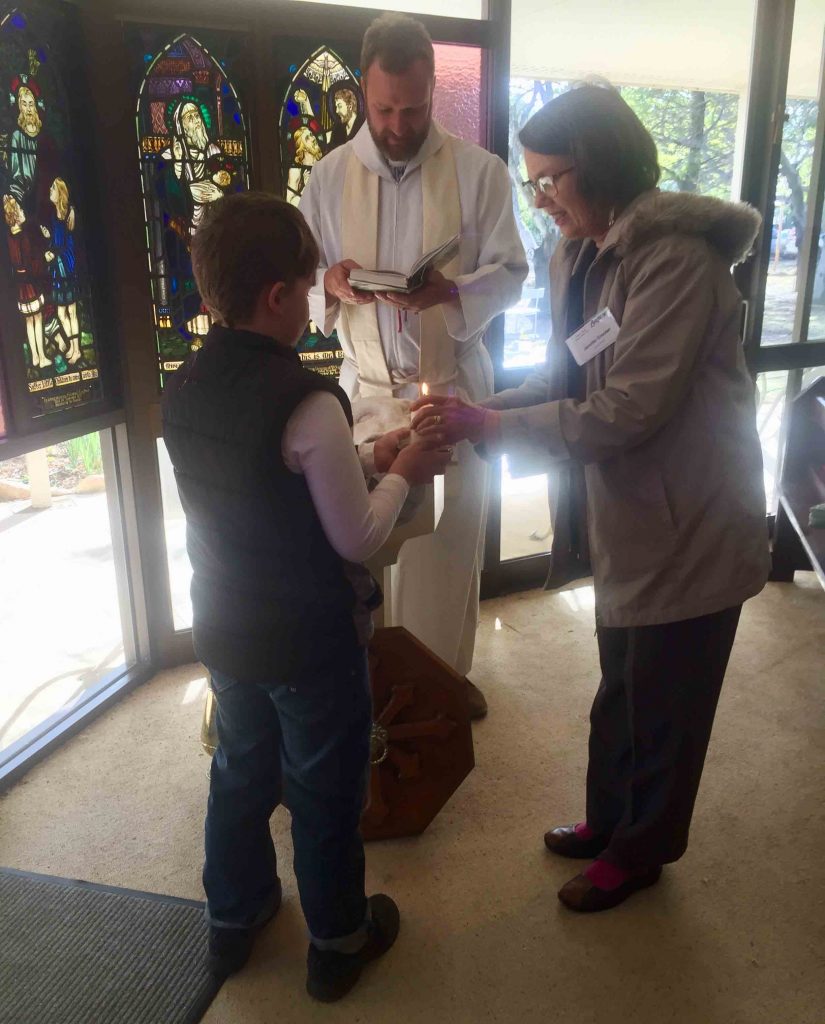
Zac Tetlow, who was baptised by The Rev’d Steffan van Munster, being presented with a candle by Liturgical Assistant Jennifer Crocker
What have been the highlights of your roles so far?
Working with The Rev’d Steffan van Munster, Priest-in-Charge of the Maranoa Warrego Anglican Mission Areas, as he walked beside people through some difficult years, and with the Councillors of Mitchell and MWAMA to continue the work of Jesus.
What are your plans and goals for the next few years?
In time I need to transfer to Roma because it is our business centre and if we can no longer manage in the cottage on our property ‘Crochdantigh’ we will move to Roma. Our grandsons go to school there and we pass through there en route to visit family in Central Queensland, Brisbane and Sydney. However, our son married into an old Mitchell family who have names in the church’s stained glass windows and the challenges of MWAMA still excite me.
Advertisement
What are you most looking forward to at Synod this year?
It is my first Synod and I want to listen and to also discuss how the broader Diocese can further support food producers and land stewards. At Synod’s Open Space this year, I hope to help people understand the biggest challenge of rural people.
What is your favourite scripture and why?
“Therefore, since we are justified by faith, we have peace with God through our Lord Jesus Christ, through whom we have obtained access to this grace in which we stand; and we boast in our hope of sharing the glory of God. And not only that, but we also boast in our sufferings, knowing that suffering produces endurance, and endurance produces character, and character produces hope, and hope does not disappoint us, because God’s love has been poured into our hearts through the Holy Spirit that has been given to us.” (Romans 5.1-5)
Justification through faith and the idea that hardship builds character have comforted me and helped me through a few challenging times.
What person of faith inspires you the most and why?
The women in our Bible study at Banana, which has a population of around 100 people, were Lutheran, Nazarene, Uniting from Methodist and Presbyterian traditions, and Roman Catholic. We all used different versions of the Bible, yet found common ground. They lived with love and I learned more than Bible insights from them.
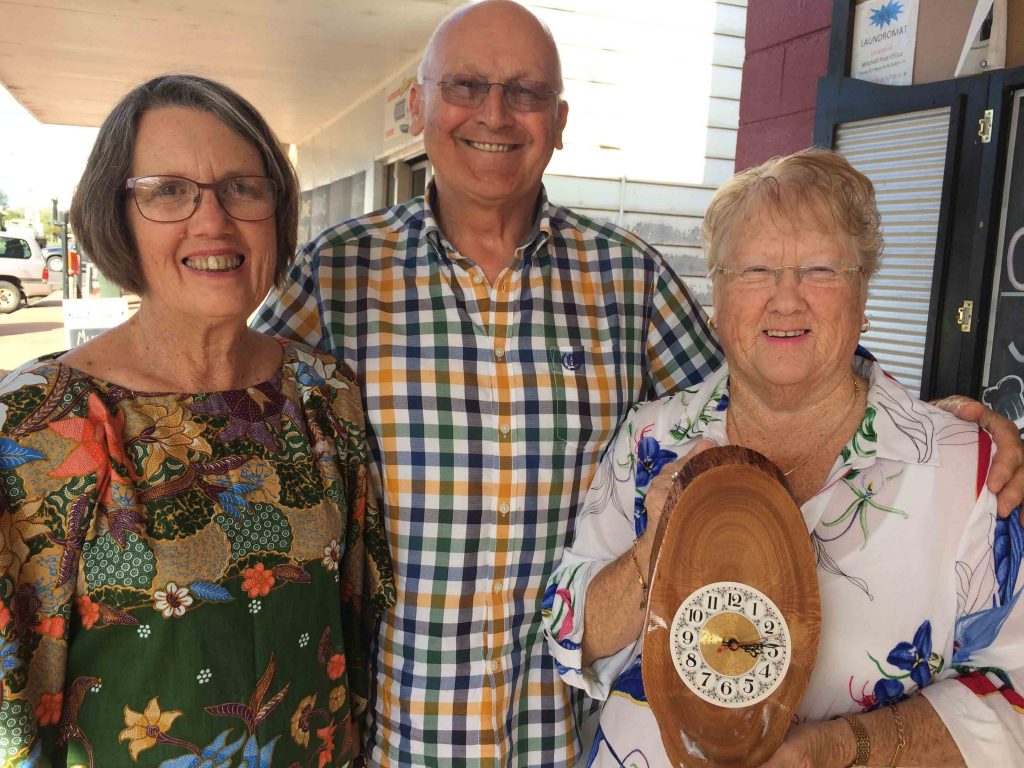
Jennifer Crocker presenting a thank you gift to regular visitors and valued friends Alan and Pat Beggs from Adelaide, who spent weeks working on the renovation of the Historic Bush Brothers’ Cottage in Mitchell, pastoral work and helping with services.
What are some of the challenges currently faced by the Church and what can be done to help overcome these?
Some Christians can be so busy doing their good works for everybody else, they neglect those in church with them or in the same street or working to provide services for their community. The Anglican ritual is beautiful and a great comfort to those steeped in it and people who like regularity and tradition.
Advertisement
Newcomers or people used to variety in their lives like responsiveness. It is important to spend time with newcomers or the shy person who seems not to want to join in, as well as do our duties around the church and catch up with people we know.
What are the some of the current challenges faced by people in Western Queensland and how can our broader Diocese help?
The challenge of distance and declining population is faced everywhere, except in the south east corner. It would be more appropriate to say ‘outside the south-east’. There is a fear a dichotomy could be set up between ‘the west’ and ‘the rest’. Putting ‘out’ before ‘the west’ removes us further in people’s minds.
Financial help with ministry is invaluable. Our church cattle scheme whereby stock is raised on local properties to raise church funds, is almost de-stocked because of continuing rainfall deficiency. People can help by donating to the Archbishop’s Emergency Relief Appeal and the Bush Ministry Fund. We have wonderful support from people who donate to the Bush Ministry Fund and I feel loved when I go to churches over east. We need to know that our work in the paddocks is supported and that the broader Diocese cares about people who produce food and fibre, care for the land and extract the minerals necessary to maintain our standard of living.
Many properties are now legally prohibited from harvesting mulga on their land for feed as they have done for generations, exacerbating the hardship. Population decline is crippling communities as government and big business base services in cities and leave us with merely an internet link. However, Mitchell had no internet or landlines for six weeks in the change-over to NBN.
Our wider Diocesan community can help by coming out and visiting our towns. So many visitors wish they had come sooner to the starry nights. Join us for worship and appreciate the treeless black soil plains crossed by lines of trees that sometimes find themselves in raging streams, the vestigial ooline rainforest, or the seemingly endless mulga. It is a big, beautiful land with a big God in charge.
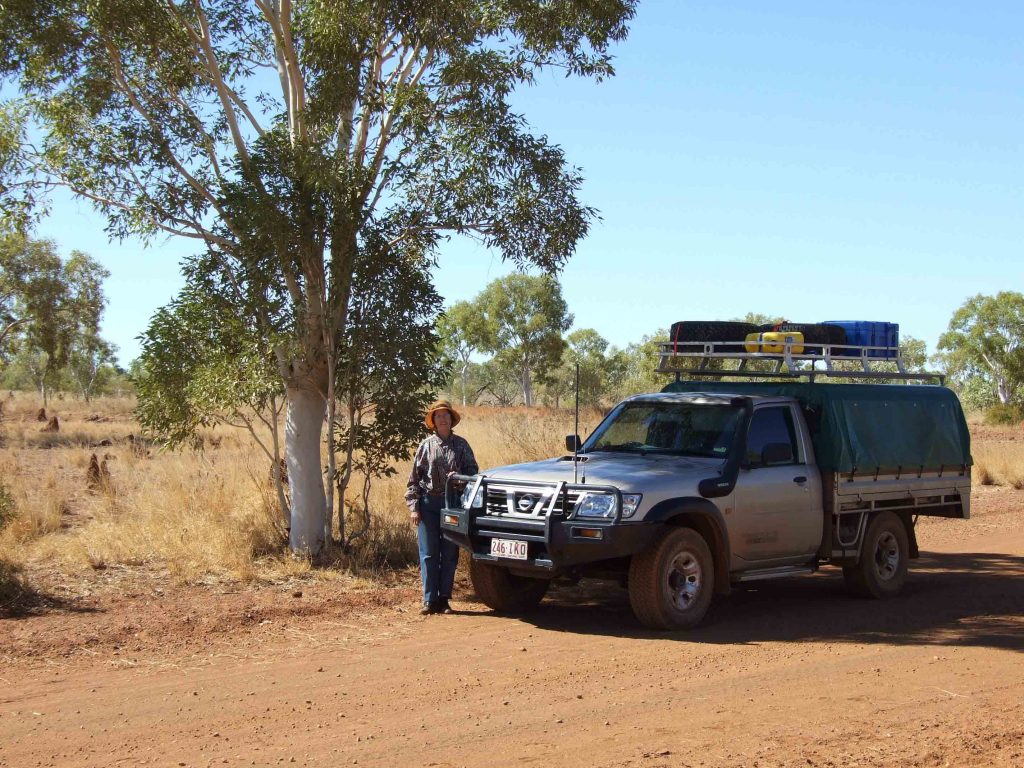
Jennifer Crocker on the Gibb River Road on her first remote trip in 2009
What are some of the current challenges faced by food producers in Queensland outside the south-east and how can the broader Diocese assist?
The population decline is exacerbated by graziers selling their trees for a large enough annual payment to reduce staff and even leave the property. When lightning starts a bushfire, there is nobody to fight it and tracks that were maintained to check cattle and waters are no longer passable to access the fire. It is a huge worry for those remaining. National Parks likewise do not have sufficiently maintained tracks and a law was recently introduced to the Queensland Parliament that will allow park rangers to go on adjoining properties to access their park. This poses a biosecurity risk and an infringement of landholder’s property rights. 10 days’ notice is to be given, but private landholders cannot refuse permission. I would like the Church to recognise the erosion of the rights of private landholders when they talk about justice for everybody else.
You are proud of the ways that Australian food producers care for creation. Can you tell us how you respond to the nature around you?
When we live with nature we have to observe it, be humble to it and work with what God gives us in terms of climate, locust and mouse plagues, and helpful viruses we can spray on heliothis grubs so we don’t have to use harsh chemicals. God is so good!
What do you do in your free time to recharge and relax?
I sew my way through the stash, cook with food we grow or wild harvest and I make kombucha tea, yoghurt, ice cream, pesto, hummus and jams and preserves. Our son is taking over the farm books and I no longer drive tractors or muster, but the thrill of seeing rows of chickpea or wheat plants emerge over hundreds of acres does not wane.
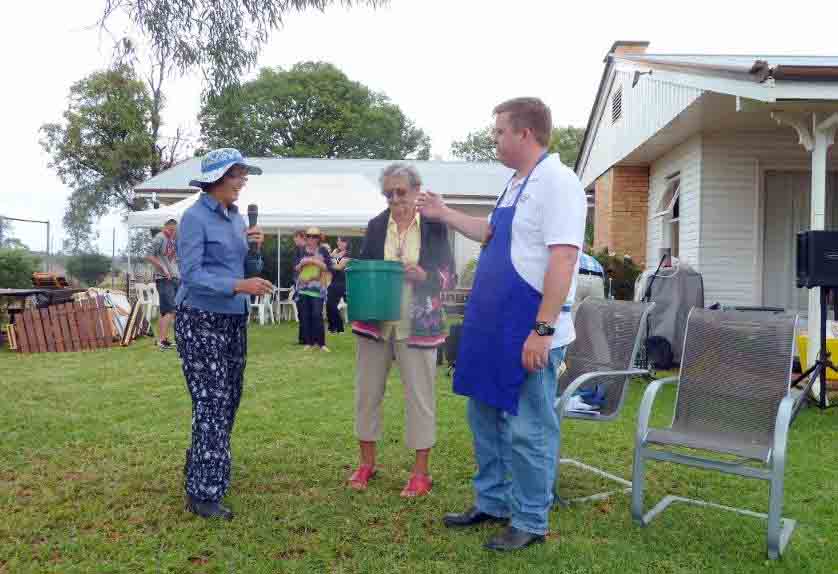
Garden Day in Mitchell with (l-R) Jennifer Crocker, Estelle Taylor and Stuart Webb
What is your favourite movie and why?
I have never favoured movies as entertainment and it is 300km to the nearest movie theatre now the Roma theatre is closed.
Where have you travelled to?
When the children were growing up in Central Queensland we travelled north to the Burdekin and south to Canberra by every possible route to visit grandparents. Since then, my husband Malcolm and I have crossed most of the Australian deserts, Southern WA, the Kimberley and the Gulf Country camped comfortably under a canopy on the back of the ute, and travelled the Great Ocean Road and Tasmania. We look forward to our fourth overseas trip, a farm tour in Europe later this year.

